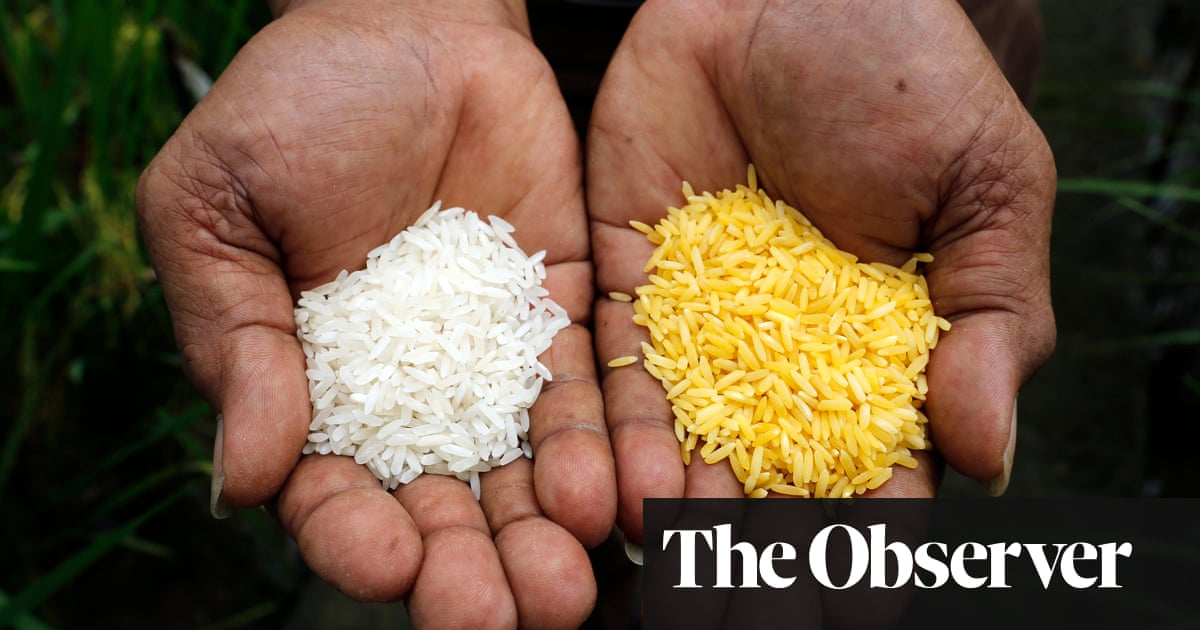
Stifling international regulations have been blamed for delaying the approval of a food that could have helped save millions of lives this century. The claim is made in a new investigation of the controversy surrounding the development of Golden Rice by a team of international scientists.
Golden Rice is a form of normal white rice that has been genetically modified to provide vitamin A to counter blindness and other diseases in children in the developing world. It was developed two decades ago but is still struggling to gain approval in most nations.
“Golden Rice has not been made available to those for whom it was intended in the 20 years since it was created,” states the science writer Ed Regis. “Had it been allowed to grow in these nations, millions of lives would not have been lost to malnutrition, and millions of children would not have gone blind.”
Vitamin A deficiency is practically unknown in the west, where it is found in most foods. For individuals in developing countries, however, vitamin A is a matter of life or death. Lack of it is believed to be responsible for killing more children than HIV, tuberculosis or malaria – around 2,000 deaths a day. On a global scale, about a third of children under five suffer from the condition which can also lead to blindness.
As a solution to this crisis, Peter Beyer, professor of cell biology at Freiburg University in Germany, and Ingo Potrykus of the Institute of Plant Sciences in Switzerland, turned to the new technology of genetic manipulation in the late 20th century. They inserted genes for a chemical known as beta-carotene into the DNA of normal rice. In this way, they modified the rice genes so that the plants started to make beta-carotene, a rich orange-coloured pigment that is also a key precursor chemical used by the body to make vitamin A.
“In Bangladesh, China, India and elsewhere in Asia, many children subsist on a few bowls of rice a day and almost nothing else. For them, a daily supply of Golden Rice could now bring the gift of life and sight,” states Regis in his book, Golden Rice, which is published this month.
Unfortunately, that daily supply has not materialised – and Regis is clear where the blame lies. For a start, many ecology action groups, in particular Greenpeace, have tried to block approval of Golden Rice because of their general opposition to GM crops. “Greenpeace opposition to Golden Rice was especially persistent, vocal, and extreme, perhaps because Golden Rice was a GM crop that had so much going for it,” he states.
For its part, Greenpeace has insisted over the years that Golden Rice is a hoax and that its development was diverting resources from dealing with general global poverty, which it maintained was the real cause of the planet’s health woes.
Nevertheless, this opposition did not have the power, on its own, to stop Golden Rice in its tracks, says Regis. The real problem has rested with an international treaty known as the Cartagena Protocol on Biosafety, an agreement which aims to ensure the safe handling, transport and use of living modified organisms, and which came into force in 2003.
The Cartagena Protocol contains a highly controversial clause known as Principle 15 or, more commonly, the precautionary principle. This states that if a product of modern biotechnology poses a possible risk to human health or the environment, measures should be taken to restrict or prevent its introduction. The doctrine, in the case of Golden Rice, was interpreted as “guilty until proven innocent”, says Regis, an attitude entirely out of kilter with the potential of the crop to save millions of lives and halt blindness.
As a result, every aspect of Golden Rice development, from lab work to field trials to screening, became entangled “in a Byzantine web of rules, guidelines, requirements, restrictions, and prohibitions”, and it is only in the last few years that steps have been taken to give it approval – though so far only in the US, Canada and Australia. It is still awaiting the go-ahead – hopefully by the end of this year – in countries such as the Philippines and Bangladesh, where it is far more urgently needed.
“The effects of withholding, delaying or retarding Golden Rice development through overcautious regulation has imposed unconscionable costs in terms of years of sight and lives lost,” Regis concludes.
Golden Rice: The Imperiled Birth of a GMO Superfood is published by Johns Hopkins University Press
from Hacker News https://ift.tt/2BPxlqF
No comments:
Post a Comment
Note: Only a member of this blog may post a comment.